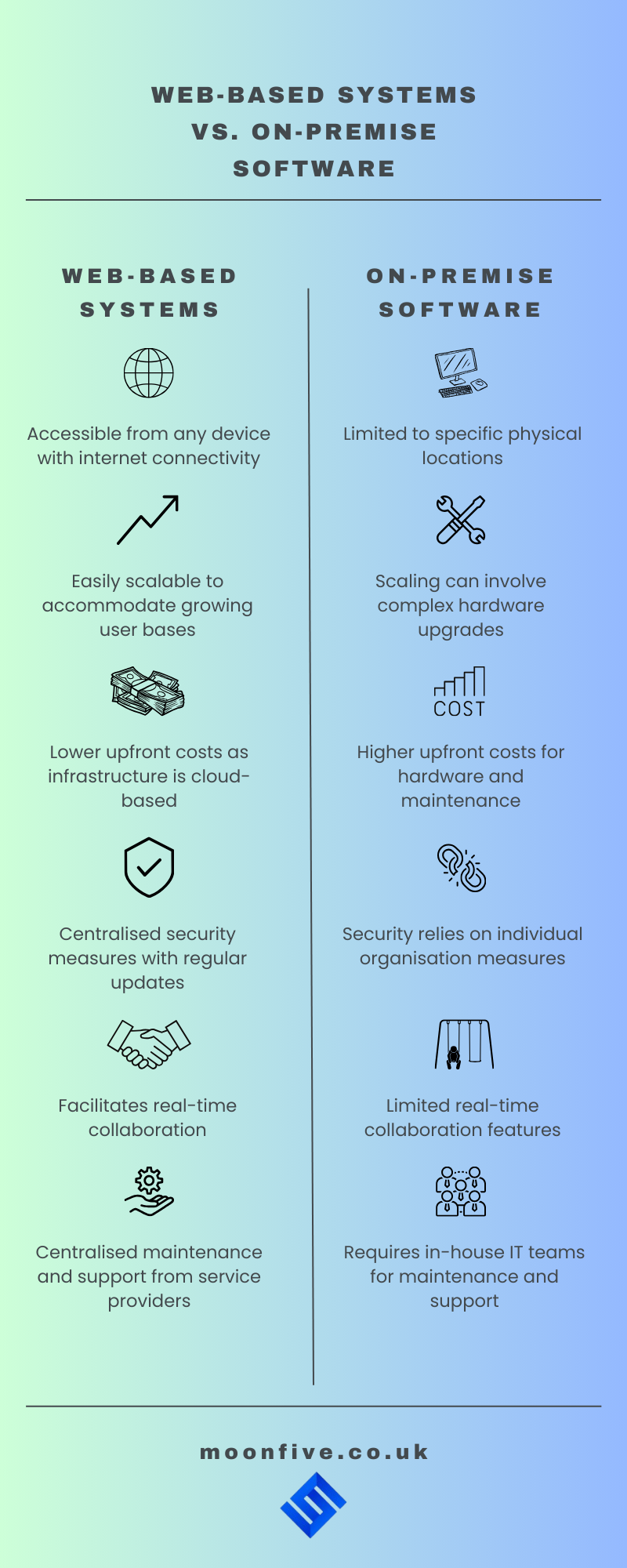We’re sure you don’t need reminding how rapidly the business landscape is evolving, however it is crucial to remember the importance of leveraging these advancements to manage your business operations efficiently and effectively. With technology playing a key role, more and more businesses are turning to web-based management systems to streamline their processes, boost productivity, and stay competitive. Let’s explore the world of web-based management systems, their benefits, and how they can transform the way you run your organisation.
What Are Web-Based Management Systems?
Web-based management systems (also known as web-based management software or simply web-based systems) are digital platforms designed to facilitate the management and administration of a variety of business functions and processes. These systems are accessible via a web browser, so there is no need for any software installation. These systems offer a centralised and secure online environment, allowing users to collaborate, access data, and perform tasks in real time.
Key Features of Web-Based Management Systems
- Accessibility: These systems can be accessed from anywhere with an internet connection, providing flexibility for remote work and on-the-go access. Clearly a very important feature considering around 40% of the UK workforce work from home at least some of the time.
- Collaboration: They enable seamless collaboration among team members, regardless of their physical location. Integration of features such as messaging, commenting, and file sharing allows users to easily communicate with their team, regardless of location.
- Automation: Many web-based management systems incorporate automation features, streamlining repetitive tasks and workflows. This means no more human error, and much more time for you to focus on the more valuable tasks on your to-do list.
- Data Integration: Integration with other tools and databases allows for the exchange of data and information across different applications. Web-based management systems often support APIs to seamlessly exchange data with other tools utilised by your business.
- Security: Web-based systems can employ robust security measures to protect sensitive data, boosting your cyber security with encryption, user authentication, and more. Regular security updates can be handled with ease, since the system is not installed locally on your devices.
- Scalability: Growth is crucial to the long-term success of a business, and web-based systems can be easily scaled to keep up with increased demands and user volumes. Customisation features enable systems to be tailored without difficulty, allowing organisations to expand and adapt the system as their business needs evolve.

Types of Web-Based Management Systems
No matter what your business needs are, there is a web-based system that you will benefit from. Some common types include:
- Customer Relationship Management (CRM) Systems: Organisations can manage interactions with customers, track leads, and nurture client relationships with a web-based CRM system.
- Human Resource Management (HRM) Systems: HRM systems assist with personnel management, including recruitment, payroll, performance evaluations, and employee-self service.
- Project Management Systems: These tools facilitate project planning, task allocation, progress tracking and collaboration among team members, and can cater to different methodologies depending on your requirements.
- Inventory and Supply Chain Management Systems: These systems can be used to optimise inventory levels, track shipments, and manage supplier relationships.
- Financial Management Systems: All of your accounting, budgeting, invoicing, and financial reporting needs can be met with one web-based financial management system.
- Learning Management Systems (LMS): These systems facilitate the administration, documentation, tracking, reporting, and delivery of educational processes or training programs.

What Are the Benefits of Web-Based Management Systems?
- Enhanced Efficiency: Automating routine tasks and centralising data means that a web-based system will boost operational efficiency and reduce manual errors.
- Improved Collaboration: Team members can work together seamlessly from opposite ends of the country (or for that matter, the globe), so organisations with web-based management systems can see better communication and decision-making.
- Cost Savings: Since there is no need for extensive hardware or software installations, web-based systems are often more cost effective to implement and maintain.
- Real-Time Insights: The opportunity to access real-time data and analytics will allow businesses to make informed decisions and adapt quickly to changing market conditions.
- Flexibility: Gone are the days of thinking “I wish this system could…” as web-based systems can be customised to suit your specific business needs, and can easily be adapted as these needs evolve.
- Centralised Data: Web-based management systems provide a unified and consistent source of information, so you can get the data you need, when you need it. No more searching through various folders!
In a nutshell…
Web-based management systems are indispensable tools for businesses seeking to stay competitive and optimise their operations. Whether you’re looking to streamline customer relationships, manage your HR function, or enhance your project management capabilities, there is a web-based system tailored to your needs. By embracing the power of web-based management systems, you will unlock new levels of efficiency, collaboration, and success for your business.
Do you want to find out how web-based systems can take your business to the next level? Get in touch!

